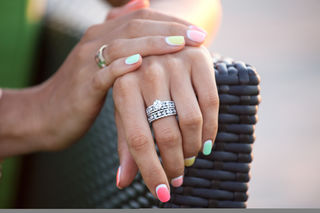Marriage
Your Wedding Ring: What to Do with It When the Marriage Ends
A survey of 400 women reveals the ingenious ways they dealt with their rings.
Posted August 27, 2018 Reviewed by Ekua Hagan
What is the meaning of a wedding ring? As a universal symbol, those few ounces of fine metal and precious stone are supercharged with significance. You received it at a pivotal moment, the heart of your relationship, when you were filled with love, excitement, and anticipation. And every day after that, every moment if you wore your ring constantly, it signaled your position as a wife and as someone who is loved. Your ring proclaimed a primary fact of your identity — you’re married.

For some women, a wedding band has a sacred significance. It represents the promise spoken at the marriage ceremony — to love, honor, respect, protect — forever. It represents a covenant. The ring absorbs that meaning and continuously radiates it.
For others, the ring’s loveliness expresses the beauty of the love that surrounds it. The fact that it is a pleasure to the eye fills your heart with joy. The ring itself is great to own. You’re proud of it. It makes you happy.
Yet to still others, its primary significance is the message it transmits to the world. You’ve accomplished one of life’s valued milestones — you are part of something bigger — a family. When you meet someone new, they glance at your left hand and instantly know that you’re married. Your ring says it — you’re not alone.
With everything women go through at the end of a marriage, particularly if the separation was not their choice, the decision about what to do about the ring is often a struggle. I wanted to know more about how different women dealt with it so I sent a survey out to the Runaway Husbands community and boy, did I get a response! It’s an important issue and women wanted to tell their story.
The 400 women who responded to the survey had been left anywhere from less than 6 months to more than 5 years prior, with the majority having been left between 2 and 5 years ago. Ninety-two percent had removed their wedding ring. Of the 8 percent of women who were still wearing theirs, you'd think those were all marriages that ended recently – but some were five years out or more, as well.
Most women remove their ring when it becomes clear that the marriage is over regardless of their legal status, but some women choose to continue wearing their ring until the actual legal divorce has been completed. Here’s an example taken from responses to the survey:
I consider myself married until I'm divorced (I'm a practicing Catholic). At the same time, I will likely remove my ring (I've never taken it off in 42 years, so it doesn't come off readily!) once I'm legally separated.
And here is an example of someone who feels the sacred commitment that wearing the ring represents:
I wear my rings because I am married in the eyes of God and the law. I wanted the rings to be a public and personal symbol of the covenant between my husband and me. I don’t know at what point I will take them off.
And another with an extra twist:
I wore it until the divorce was finalized. I wore it to prove a point in that I believe in marriage, didn’t want the divorce and I knew it probably made him and his whore angry.
Most women removed the ring and stuck it away in a jewelry box because the end of the marriage drained it of meaning. Within the Runaway Husbands community, husbands often burn their bridges as they leave the marriage, telling their wives that they never really loved them and that the marriage was a sham. The decision to remove the ring signifies an acceptance that the relationship is really over.
I removed it because it symbolized something beautiful and unbreakable. It meant I was loved, protected, honored, respected, and cared for. My husband did not have any of those feelings for me and by wearing it, I felt like I would be disrespecting the ring’s meaning.
We had "forever and always" engraved on our rings and I wore that ring for 36 years believing in what it said. My husband decided, alone, in what seemed like a moment, that it was not going to be forever. That ring no longer represents a love and respect that lasts forever and always so I took it off. It is back in the box it came in.
And some women took action, using the ring to make a point:
- After I realized he was gone for good, I threw it in the trash.
- I removed it and threw it at my ex-husband for breaking our wedding vows.
- I threw it into a canal not far from my home. It actually felt good to do this.
Some women solved the dilemma of how to keep the beautiful ring they loved when it hurt to look at it by transforming it into something else, in a sense, talking ownership of it. Several women talked about having the ring redesigned:
I reset my engagement ring diamonds and 10th anniversary band diamonds into a fabulous ring that I still wear. Why should all those diamonds sit in the safety deposit box? I’m worth a fabulous ring.
I had the gold melted down and turned it into a ring with a cross and my diamond was put in the middle. I added amethyst stones around the diamond and inside the ring, I had the jeweler engrave the saying “With God, all things are possible” to remind myself that I am not alone, that God is walking right beside me. I wear the ring on my wedding finger so my next biggest hurdle is moving it to the other hand.
Quite a number of women talked about saving the ring for their daughters later on or giving it to a son who was expecting a baby so he could give it to his girlfriend.
I removed my ring because I wanted to cut off my tie to a husband that basically left me with no emotional or financial help or remorse. Who wants to wear a symbol tied to someone that basically is selfish and only thought of himself? I ended up giving my ring (beautiful band of diamonds) to my precious daughter-in-law. My ring looks wonderful on her! Out of sight, out of mind!
Several women talked about the stigma of being single or divorced and how they felt ashamed to not be wearing a ring:
The ring meant a lot to me. I removed it right away but hid my empty left hand from the public as much as possible. It embarrassed me to be unwanted.
I wore it for a while mostly because of the stigma of not having it on (I was pregnant when he left). Then I took it off because it felt like a lie.
I removed it immediately. Why would I want to wear a symbol of a relationship that no longer existed? It was hard, and for a long time I felt like everyone was looking at my naked finger and judging me as someone who was divorced or never married, i.e., a failure.
Finally, a lot of women talked about selling or pawning the ring and putting the money to some good use:
- I sold it to buy Christmas gifts for my children.
- I sold it and used the money to take a girls' trip to Europe!
- After a few years, I gave it to the Bridge, a resale shop for battered women.
- I had to pawn it to retain an attorney.
- I sold them for cash and used it to renovate my bathroom.
- I sold it and put the money towards a down payment on a new house.
- I sold the ring for food and housing for the family when a month was really bad.
- Sold it this summer and bought a ticket for Hamilton. Worth every penny!
The last word goes to a woman with a message we all need to heed:
I sold it and with the money, a friend who is a goldsmith made me a new ring. With this ring, I made a vow: always love and be true to myself.
Share your wedding ring story below in the comments. What were your thoughts about removing your ring at the end of your marriage?




